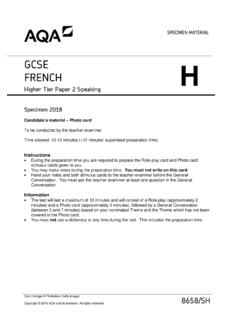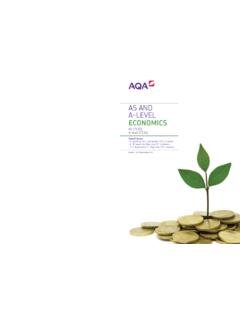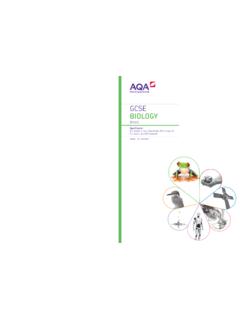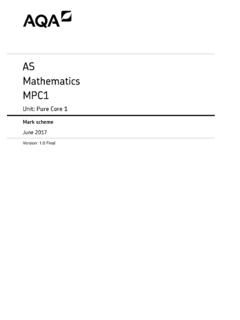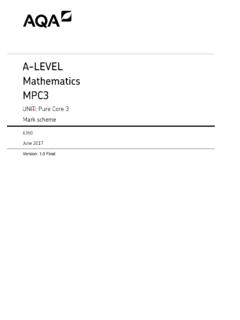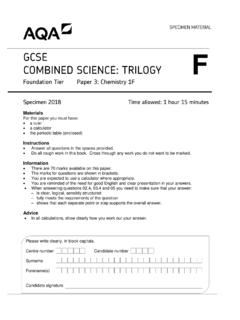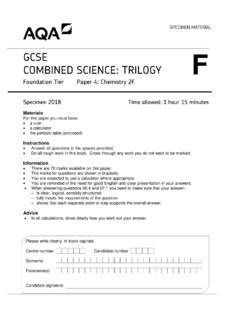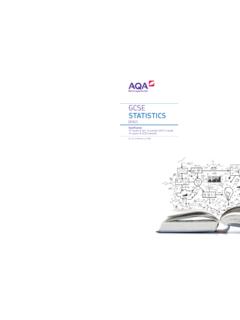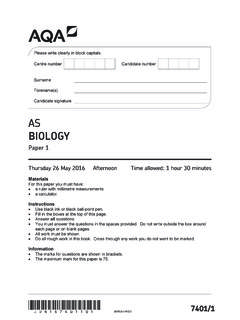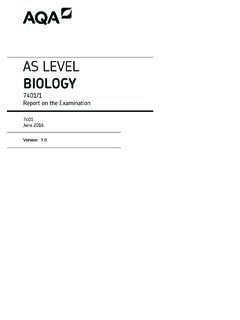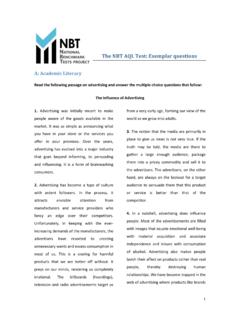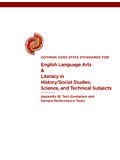Transcription of A-level Law Exemplar scripts with examiner …
1 RESOURCES A-level LAW LAW01 - Law making and the legal system Exemplar scripts with examiner comments (2160) Exemplar scripts WITH COMMENTS A-level LAW LAW01 This booklet consists of real exam questions from a past paper, genuine student responses, and marks/comments from the Principal examiner . Each question and its accompanying mark scheme are given in full, and the commentaries are grouped together at the end of each Section of the paper, so that you or your students can have a go at assessing/marking each answer without anything to influence your judgment, before checking your marks against those of the Principal examiner . Copyright 2014 AQA and its licensors. All rights reserved. AQA retains the copyright on all its publications. However, registered schools/colleges for AQA are permitted to copy material from this booklet for their own internal use, with the following important exception: AQA cannot give permission to schools/colleges to photocopy any material that is acknowledged to a third party even for internal use within the centre.
2 Exemplar scripts WITH COMMENTS A-level LAW LAW01 Contents Section A: Law Making .. 4 Topic: Parliamentary Law Making .. 4 Topic: Delegated Legislation .. 10 Topic: Statutory Interpretation .. 16 Topic: Judicial Precedent .. 22 Section A: Commentaries .. 28 Topic: Parliamentary Law Making .. 28 Topic: Delegated Legislation .. 29 Topic: Statutory Interpretation .. 30 Topic: Judicial Precedent .. 31 Section B: The Legal System .. 32 Topic: The Civil Courts and other forms of dispute resolution .. 32 Topic: The Criminal Courts and lay people .. 38 Topic: The Legal Profession and other sources of advice, and funding .. 44 Section B: Commentaries .. 50 Topic: The Civil Courts and other forms of dispute resolution .. 50 Topic: The Criminal Courts and lay people .. 51 Topic: The Legal Profession and other sources of advice, and funding.
3 52 Exemplar scripts WITH COMMENTS A-level LAW LAW01 Section A: Law Making Topic: Parliamentary Law Making Potential Content (A) Outline of process in the House of Lords: introduction of Bill by Minister for a Government Bill or promoter for a private member s bill order of readings first reading, second reading, committee stage (whole House), Report stage, third reading general amending role looking at legislation passed by Commons; if Bill has been amended, it goes through ping-pong procedure in conjunction with House of Commons until final agreement has been reached on wording of all clauses. Enhancement Reference to different forms of Bills (Private, Public and Private Members); possible reference to constitutional role of Queen in Parliament and effect of Royal Assent bringing a Bill into force; possible reference to Parliament Acts 1911 and 1949.
4 For Sound (A) all three bullet points to be outlined. (B) Outline of doctrine of Parliamentary supremacy (sovereignty): legal supremacy (sovereignty) (highest form of law, must be applied by judges, Parliament not being able to bind its successors). Enhancement Political sovereignty that the electorate can vote a Parliament out at the next election. 0 1 Outline the following: The law-making process in the House of Lords and The doctrine of Parliamentary supremacy (sovereignty). [10 marks] Exemplar scripts WITH COMMENTS A-level LAW LAW01 Student answer for consideration The law making process in the House of Lords begins with the 1st stage which is the reading stage. The speaker will read out the general principles of the Bill and a brief summary of it and then the House votes on whether it will get to the second stage.
5 When taken to the second stage, the House will debate and discuss the Bill further but no amendments are made. Another vote is cast to take it to the Committee stage. At the committee stage, there will be 16-80 MPs with particular interests in the Bill or they have a specialism in that area. They will scrutinise the Bill clause by clause and make any amendments to the Bill. At the third stage, the house will look at the amendments and make further amendments if needed. However, in the House of Commons, at the 3rd reading, they are not allowed to make amendments. Once the Bill has been passed in the House of Lords, it will be sent to the House of Commons. If the House of Commons make any amendments the House of Lords will have to debate it further. Passing a Bill back and forth from each house is called parliamentary ping-pong.
6 The House of Lords can delay a Bill for up to a year. Once the year is over the Bill is passed and is sent for Royal Assent by the Monarch. Dicey had a theory about Parliament being supreme. Firstly he said that Parliament can make law on any topic. For example, if parliament said everyone has to eat jaffa cakes on a Friday everyone in the UK have to abide by that law. Secondly he said that no-one can question or undermine Parliamentary law; courts have to follow parliamentary law. Thirdly, Dicey said that no one parliament can bind its successors. This means that parliament in 20 years time won t be bound by what parliament has done in today s Parliament. However, in 1973, the UK joined the EU. Joining the EU means that the UK s parliament lost some of their power to the EU. European Constitution of Human Rights, states that people who join the EU have to follow EU law.
7 EU supremacy was established in the case of Costa where the EU said as Italy joined the EU, it lost some of its power to them. The UK case of Factortame where Spanish fisherman were fishing in UK waters. UK Merchant Fishing act states there had to be a certain amount of English people in the boat. EU said it went against their movement of work and was discriminating against nationality. We can leave the EU if the PM says we have a referendum (a vote) on whether the UK leaves the EU. Exemplar scripts WITH COMMENTS A-level LAW LAW01 Potential Content (A) Description of pressure group as an influence: general description of the meaning of pressure group, including reference to the different types of group (insider and outsider, sectional and cause groups), how, when and whom they can influence insider groups likely to be involved in the drafting of a Bill and may be consulted by minister or civil servants; sectional groups likely to be consulted when legislation is being drafted that affects their group of members; consultation may be arranged following lobbying.
8 Direct action such as strikes or demonstrations likely to be used by outsider or cause groups who may not be consulted in law making process the effect of influence by reference to campaigns or example(s) successful such as Snowdrop, unsuccessful such as Fathers4 Justice. Note: for Sound (A) all three bullet points to be described. 0 2 Describe pressure groups as an influence on Parliamentary law making. [10 marks] Exemplar scripts WITH COMMENTS A-level LAW LAW01 Student answer for consideration Pressure groups are groups of individuals are people campaigning for changes in the law. They can range from individuals to a network or millions, eg National Trust with over 2 million people part of it. They use a range of methods, such as lobbying, contacting their MPs and the media. Major sectarian groups are often more influential as they contain huge numbers of wealthy people whose support the Government want.
9 An example is the Law society. The Government are unlikely to pass a law directly affecting them. As they are wealthy, they are able to conduct expensive research to support them (if they were ever in need to influence Parliament). Cause groups are pressure groups who campaign for a cause or belief. They are often considered outsider groups because they don t have much direct contact with the Government. The RSPCA is an example. They use the media such as touching TV advertisements showing abused animals to try put their point across and petitions. They have succeeded in making Parliament process laws of stopping animal cruelty. Often individuals campaign for change in Parliamentary law-making such as Jamie Oliver, with his tour for healthy eating in schools. With his specialist knowledge and pressure group publicity he has succeeded in getting the Government to pass laws on school dinners containing fatty food and fizzy drinks and more meat, fruit and veg and portions of potatoes.
10 His pressure group and campaigning brought about by his tv programme and tour, helped raise awareness of the importance of children s healthy eating and how it can affect their behaviour. Insider groups, such as the Law society have direct influence in Parliament whereas outsider groups don t. Fathers for Justice (an outsider group but often considered an insider group recently) has resulted to extreme means to promote their point of fathers seeing their children. They have tied themselves to building and performed other stunts. Exemplar scripts WITH COMMENTS A-level LAW LAW01 8 of 52 Potential Content (A) Brief discussion of advantages of pressure groups as an influence could include: can raise public awareness of issue and keep Parliament/MPs in touch with issues of public concern many are non-political but can influence all political parties will have expertise on their issue for some groups, eg National Trust or TUC, the size of their membership means they can be representative of general public and be more influential as they will have large budgets and be able to afford media campaigns some groups can provide international experience and contacts insider groups have the ear of decision makers and can be consulted on proposed changes likely to be successful if they have media support.
